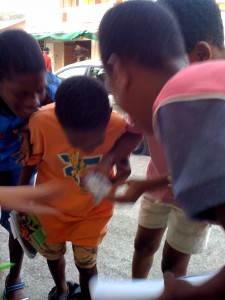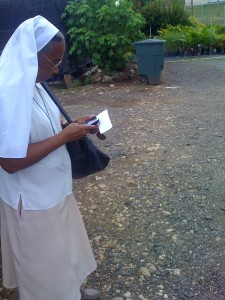Archive for the ‘Research’ Category
“Problems and dsolutions with interactive devices” - Harold Thimbleby
Available on iTunesU: Problems and dsolutions with interactive devices
In this talk, Harold Thimbleby, of FIT Lab, is arguing that design (and life) problems can be effectively exposed through telling good stories. The story format Thimbleby advocates for is a “dstory,” a video under 2 minutes with still images and voice over.
Dstories have the ability to shine light on problems which are generally accepted or overlooked in daily operation. They use a particular incident to highlight a particular design problem by connecting to people you want to take action.
The Dstory method could be interesting for prototyping. Thimbleby’s talk also highlights how annoying it is to quickly create and store video files.
“Design, Innovation and Leadership” - Carole Bilson
“Design, Innovation and Leadership” podcast from the University of Michigan Penny W. Stamps Distinguished Visitors Series
Response: There’s not that much here for me. Bilson thought that designers could make a bigger impact in companies and wanted to prove it. It’s mostly corporate ideas. Bilson works for an mailing documents company, and one perhaps interesting thing brought to my attention was the use of indicia, which I thought might have some vauge connection to mobile banking.
Microsoft India
Need to spend some time looking at Microsoft’s Research team in India, specifically their Technology for Emerging Markets, even more specifically:
- Financial service delivery to the poor and technology - which is looking into how those who live in poverty access financial services
- Warana unwired - which replaced PCs with phones using an SMS gateway for a rural sugarcane coop
- The use of ICTs by small and informal businesses - which looking into information and communication habits of micro-businesses (businesses with less than 5 people)
- The digital studyhall - which is “Netflix + YouTube + Kazaa”
Jan Chipchase, “Our cell phones, ourselves”
Response:
I’ve been interested in Chipchase and his work for some time now. His blog is available at www.janchipchase.com. This talk sums up lots of his work.
The most important thing that Chipchase talks about, for me, is how a cell phone becomes a source of identity in a mobile world. I’ve certainly have always felt a connection to those that matter to me carrying different phones with the same phone number since I was 15. I think it has certainly allowed me to travel more freely and with less worry. I wonder if mobile phones enable people or kids to travel outside of their village with more confidence than they would have before. In St. Lucia I was told kids get their cell phones during their early teen years. I think this is less prevalent in Belize, but I want to do some asking around about it.
Chipchase also brings up mobile banking and emphasizes the idea of every phone as an ATM. This, he says, is particularly important for people who may not have enough money to be considered a viable customer for a bank. Banks are extremely tedious to use here in Belize in my experience. Lines are long and there’s lots of checking with higher-ups for approval. I wonder how the immediacy and connivence of using a phone as a source of money will change accepted banking practices.
Lastly, Chipchase talks about how the things we carry are designed to meet our most basic needs and desires; we carry keys, money, and phones giving us access to shelter, food, and “an ability to transcend space and time” or to be able to communicate with people that are far away. Keeping in mind these basic needs seems will be an important litmus test in prototyping.
Notes:
planet earth: 6.3 billion
cell phone connected: 3.3 billion
- “What do you carry?”
- keys, money, and mobile phones are the big ones
- Why keys, money and mobile phones?
- for survival for us and our cell phone
- these are at the bottom rungs of Maslow’s Hierarchy of Needs
- phones help you transcend space and time
- but a mobile phone is personal and convenient
- but humans forget
- point of reflection- the pocket tap moment
- center of gravity- where you keep these objects
- 799 million illiterate in 2004
- if you can’t read and write you need a way to manage contact information
- illiterate people are masters of delegation, they ask others to do it
- Ugana- sente, means ‘money’ or ‘to send money as air time’ - buy a prepaid card, read number to village phone operator, operator takes commission and then passes the rest in cash to another person
- this turns everyone’s phone into an ATM
- this is very elegantly designed and in tune with local need
- difference here from grameen, etc., is that there is no central authority
-phone numbers written above a house instead of house numbers
- people’s identities are mobile with a mobile phone.
- What will it be like when everyone is connected?
1. The immediacy of ideas.
2. The immediacy of objects.
3. The street will innovate beyond intention
4. Conversations and our ability to listen. With more people connected more people want to be a part of the conversation.
An observation and thoughts
Observation: since I was last in Belize, cell phone carriers have begun directly depositing pre-paid phone credit via electronic means versus selling phone cards. There are even promotions to encourage this exchange (10% extra credit if you do it this way). This seems like they’re priming to get people more and more used to their phone as a device for trading money, for mobile banking.
I want to perhaps get in touch with Galen University, a private university here in Belize, to see if anyone has particular interest in sustainable development, technology, and Belize/the Caribbean.
Development/Caribbean Research groups:
- Society for Caribbean Studies, UK
- International Association of Science and Technology for Development
- Caribbean Studies Association
Also, I bought drewcogbill.com today!
Eric Brewer, “Technology for Developing Nations”
Technology for Developing Nations (1 December, 2006)
Eric Brewer, UC Berkley - TIER, TIER blog
Response: Most important ideas for me from Brewer: non-loss business, co-development, wifi for bootstraping.
Notes:
- Technology can make a difference
- Advocates for focusing on the rural poor and urban slums, as urban areas are moving forward due to market forces
- Development is: governance and technology
- Bringing wireless technology to an area can bootstrap on other infrastructure
- Wireless infrastructure is incredibly affordable, only dirt roads are cheaper
- non-loss business - sustainable but not profit generating business
- Technology solutions can be franchised from a third party loan to create a non-loss business
- River Blindness, Black Fly eliminator - used sensors to look for areas prime for black fly and sprayed - protects 30 million people from infection and makes 100,000 square miles now viable for farming
- Poor people spend lots of money, and even the poorest have a little disposable income, and they spend money on entertainment and communication, 7% of income in rural Bangladesh spent on telephony
- Mentions that technology could help in long distance money transfer ***
- Grameen Bank, Bangladesh- micro-loaning, began when noticed that poor friends paid back their small loans
- Grameen Telecom- microloans for village phones, a mobile phone woman in each village, a “super pay phone”
- Scaled with micro-finance- (***phone based money transfer, micro-financed, franchised)
- Make some project in the first six months, make shorter-term plans. 5 year plans are not ok with technology; things change too quickly.
- Develop something with a group and deploy- co-develop, co-deploy
- They have a $50 board to make a more efficient solar system
- Working mostly on long-distance wireless
- Mainly employed with rural telemedicine with rural eye clinics in India.
- These clinics serve areas without doctors. They doctor video conferences in and tells patients things after conferencing with a ‘nurse’
- They get people to go get cataract surgery
- They’ve made these clinics scalable, they’re deploying 50 more
Literacy
- Voice is a big part of developing nation communication
- there has been no work on voice recognition for many languages
- Instead of goings at it typically, they’re going to do sound recognition - won’t work with translation but will perhaps work with user interface interaction
- Make the recognizer context sensitive, minimize the legitimate words that can come in
- They’re recognizing digits well with this method
- How do you get training data from illiterate people? Using fingers to get people to say them, make people comfortable, use locals to interview, use a phone versus a microphone
Education
- cell phone game to teach english
Paper mentioned to look up: “The Case for Technology for Developing Regions” - E. Brewer et al. IEEE Computer, June 2005
Technical Anthropology, St. Lucia
St. Lucia uses British outlets and voltage, but you will often see American outlets adapted because many of the good coming into the country have American prongs. This picture taken in a community center in a fishing village called Anse la Raye, particularly well shows how readily people switch between them.

There is a given and understood social practice that after you take a picture on a digital camera, they are allowed to see it. I saw this happen time and time again in St. Lucia. Even when I took a picture of a toddler, he grasp out for the camera to see himself.

This is Sister Claire, a nun in her 70’s who runs a pre-school we did some work with. The convent recently bought her a mobile phone, and though she claims she doesn’t understand how to use it well, she can easily make and receive calls. Furthermore, she’s one of the cutest things I’ve ever seen.
Scott Jenson’s “Why Phones Are Not Computers”
“Why Phone Are Not Computers” - Human-Computer Interaction Seminar (CS 547) Scott Jenson, Google
Response: Jenson is mostly talking about how the normal web can’t be translated to traditional mobile phones. Even with more advanced phones, the screen is still much smaller than a computer screen. This talk was pre-iphone but is certainly still applicable for people living in developing nations where phones are generally older, even black and white models. Nonetheless, data plans are starting to come into these places. Here in St. Lucia, you can now get a data plan and even Blackberrys. Nonetheless, Jenson advocate for using phone applications local-based and people-based.
Notes:
Death by 1000 cuts: there’s lots of annoying steps to get content, value must be greater than pain
Default thinking: falling back on the thing we were just looking at
It is hard to use mobile phones
SMS- not originally meant to be for consumers
The Inside Text - ed. Richard Harper
Ergo myths: when you talk about phones, you have to talk about millimeters not pixels
- the mouse is gone
- focus on people in development
Examples:
- Swedish bank- sms alerts for low balance, deposit cleared
- mobile google maps- center button zooming
Arguing that people don’t want to get on the web as it is for the computer on their phone. The phone experience is different. Make it local based and people based.

